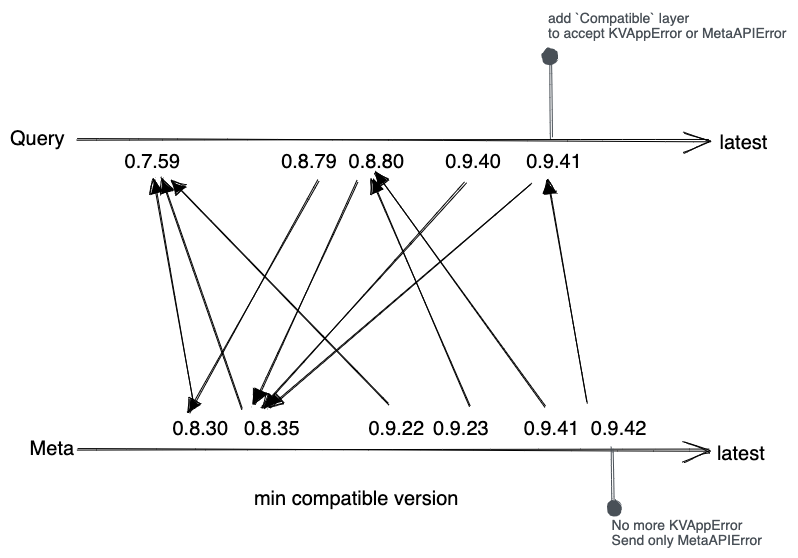Query-Meta Compatibility
This guideline will introduce how to investigate and manage the compatibility between databend-query and databend-meta.
Find out the versions
To find out the build version of databend-query and its compatible databend-meta version:
databend-query --cmd ver
# output:
version: 0.7.61-nightly
min-compatible-metasrv-version: 0.7.59Which means this build of databend-query(
0.7.61-nightly) can talk to a databend-meta of at least version0.7.59, inclusive.To find out the build version of databend-meta and its compatible databend-query version:
databend-meta --cmd ver
# output:
version: 0.7.61-nightly
min-compatible-client-version: 0.7.57Which means this build of databend-meta(
0.7.61-nightly) can talk to a databend-query of at least version0.7.57, inclusive.
Deploy compatible versions of databend-query and databend-meta
A databend cluster has to be deployed with compatible versions of databend-query and databend-meta. A databend-query and databend-meta are compatible iff the following statements hold:
databend-query.version >= databend-meta.min-compatible-client-version
databend-bend.version >= databend-query.min-compatible-metasrv-version
If incompatible versions are deployed, an error InvalidArgument will occur when databend-query tries to connect to databend-meta,
which can be found in databend-query log.
Then databend-query will stop working.
How compatibility is checked
Compatibility will be checked when a connection is established between meta-client(databend-query) and databend-meta, in a handshake RPC.
The client C(databend-query) and the server S(databend-meta) maintains two semantic-version:
Cmaintains the its own semver(C.ver) and the minimal compatibleSsemver(C.min_srv_ver).Smaintains the its own semver(S.ver) and the minimal compatibleSsemver(S.min_cli_ver).
When handshaking:
Csends its verC.vertoS,- When
Sreceives handshake request,Sasserts thatC.ver >= S.min_cli_ver. - Then
Sreplies handshake-reply with itsS.ver. - When
Creceives the reply,Casserts thatS.ver >= C.min_srv_ver.
Handshake succeeds if both of these two assertions hold.
E.g.:
S: (ver=3, min_cli_ver=1)is compatible withC: (ver=3, min_srv_ver=2).S: (ver=4, min_cli_ver=4)is NOT compatible withC: (ver=3, min_srv_ver=2). Because althoughS.ver(4) >= C.min_srv_ver(3)holds, butC.ver(3) >= S.min_cli_ver(4)does not hold.
C.ver: 1 3 4
C --------+-------------+------+------------>
^ .------' ^
| | |
'-------------. |
| | |
v | |
S ---------------+------+------+------------>
S.ver: 2 3 4
Compatibility status
The following is an illustration of current query-meta compatibility. It shows that:
- meta-0.8.30 is compatible with query-0.7.59 upto query-0.8.79;
- query-0.8.79 is compatible with meta-0.8.30 upto meta-0.9.22;
- query-0.8.80 is compatible with meta-0.8.35 upto the latest version;

Query versions that are compatible with a specific meta:
| Meta version range: | Query version range: |
|---|---|
| [0.8.30, 0.8.35): | [0.7.59, 0.8.79] |
| [0.8.35, 0.9.22): | [0.7.59, +∞) |
| [0.9.23, 0.9.41): | [0.8.80, +∞) |
| [0.9.41, 0.9.42): | [0.8.80, +∞) |
| [0.9.42, +∞): | [0.9.41, +∞) |
Meta versions that are compatible with a specific query:
| Query version range: | Meta version range: |
|---|---|
| 0.7.59, 0.8.79): | [0.8.30, 0.9.22] |
| 0.8.80, 0.9.41): | [0.8.35, +∞) |
| 0.9.41, +∞): | [0.8.35, +∞) |